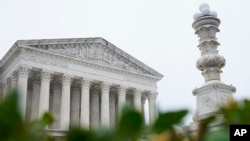The U.S. Supreme Court put in place Monday its first formal code of conduct, following months of pressure over undisclosed gifts and trips provided by wealthy donors to some justices.
The nine justices had long acted without a binding governance over their ethical behavior but have now placed themselves under a code that sets out to "gather in one place the ethics rules and principles that guide the conduct of the members of the court," according to a brief introductory statement.
In an unsigned statement, the justices said the code will put in place acceptable ethical practices that have already long been followed by the court's justices.
The new code has no enforcement mechanism, leaving compliance to each justice.
The decision comes after months of news reporting about the undisclosed gifts received by Justice Clarence Thomas and his wife from billionaire and Republican donor Harlan Crow. Thomas reportedly took luxury trips and engaged in real estate transactions with Crow and participated in fundraisers for the conservative Koch political network.
Justices Samuel Alito and Sonia Sotomayor have also come under scrutiny — Alito for a fishing trip with a Republican donor, and Sotomayor for advanced book sales through college visits.
Justices Amy Coney Barrett, Elena Kagan and Brett Kavanaugh have been vocal proponents of a code of ethics.
The ethics code comes as public trust in the court is nearing record lows, according to a recent Gallup poll.
Democrats, including Senator Dick Durbin, chairman of the Senate Judiciary Committee, have called for a code of ethics for the court and are planning to subpoena Crow and activist Leonard Leo regarding their roles in paying for Thomas' luxury vacations.
Some Republicans have dismissed Democratic efforts to investigate the justices' ethics as reactions by liberals upset at the court's conservative leaning.
Some information in this report was taken from The Associated Press and Reuters.













